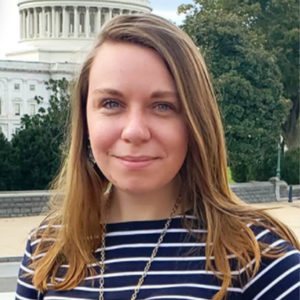It’s been 100 years since women earned the right to vote, 56 years since that right was extended to all women in our society. But the divisiveness and animosity of recent election cycles have left many feeling jaded, depressed, unheard, frustrated, and just plain over it. Can you relate?
My sisters, this is not the time to give in. Our civic duty does not end at the ballot box. It begins when we pull the levers in the booth but it continues in our prayer, our advocacy, and our service.
Think of an issue you are passionate about: abortion, racism, the death penalty, immigration. Maybe your heart is especially moved to compassion for the unborn and pregnant mothers, for the homeless, for prisoners or for refugees. Our Church has a vision of the human person that sees each human being as made in God’s image and likeness. Each person is a masterpiece.
These are the people who need your voice, your experience, your fire! When St. Edith Stein so boldly proclaimed that “a woman’s heart is a shelter in which other hearts unfold,” she captured the tenacity and tenderness of our call. Years later, this brilliant female philosopher’s writings inspired Pope St. John Paul II to urge women to transform culture, using their genius to “overcome all discrimination, violence and exploitation.”
Motivated by justice and mercy, we hear the cry of the poor, we long to protect the vulnerable, to defend life from womb to tomb, to uphold the common good.
So how can we as Catholic women be empowered to be faithful citizens? Three steps.
- Live the Call
When we purchase from ethical companies, donate to charitable organizations, serve the most vulnerable in soup kitchens, pregnancy centers, and immigration ministries, we build up the kingdom of God in our midst. Each one of you does this with your action plan. If you don’t know where to begin, look up your local Catholic Charities office. - Vote
The Catechism says citizens have a moral obligation to vote and to contribute to society “in a spirit of truth, justice, solidarity, and freedom.” And while presidential races get the most screen time, all politics are important. Elections for state office, school board, mayor, city council or county supervisor are often won by a handful of votes. There’s even been congressional races where the candidates tied and had to draw straws! These are the places where the voices and experiences of women carry the most weight. - Contact Your Elected Officials
Did you know that nearly all states have a Catholic Advocacy Network where you can contact your elected officials and follow up on action alerts that reflect the Catholic position on numerous issues? Fun fact, it’s true. Those in office represent us, and have a responsibility to hear your phone calls, emails, letters, and tweets. So sign up and let your voice be heard. Don’t leave politics just for one Tuesday in November.
And sister, I just want to remind you that you belong — truly it is the voices of women that have spurred social movements, defended life, and overcome oppression, at the ballot box and beyond.
The Maryland bishops, who I am proud to work for, wrote on the anniversary of women’s suffrage: “We are grateful in a particular way to the women who serve in leadership positions in our own (arch)dioceses, parishes, schools, and Catholic ministries for the witness and encouragement they provide to young people as women of faith, intelligence and leadership. We hold up, as well, all women who provide their children and our society a loving witness to the beauty of family life.”
Animated by faith, let’s use our gifts to make society more human, building a true civilization of love. 100 years after the suffragists achieved the 19th Amendment, our voices are needed more than ever.

Molly Sheahan, GIVEN ’19
Molly C. Sheahan is the Associate Director for Respect Life Advocacy for the Maryland Catholic Conference and holds a Master of Theological Studies (M.T.S.) from the Pontifical John Paul II Institute for Studies in Marriage and Family. Molly has published pieces at The Public Discourse, Angelus News, Life Matters Journal, OneLife LA, and The Napa Institute.
Molly previously worked for the Archdiocese of Los Angeles overseeing a portfolio of all pro-life and social justice issues and interned on Capitol Hill in both the U.S. Senate and for the Congressional Coalition for Adoption Institute. She also holds an A.A. in Spanish Language Studies and received her B.A. in Communication Arts from Franciscan University of Steubenville.
In her spare time, Molly loves adventures, classic literature, strong coffee, and volunteering with kids. She is also the founder of We Are Prolife Women, a new media movement highlighting the stories of underrepresented pro-life women from minority backgrounds.


